Analyzing Rational Emotive Behavior Therapy: Core Principles Explored
VerifiedAdded on 2023/06/13
|10
|3016
|125
Essay
AI Summary
This essay provides a detailed overview of Rational Emotive Behavior Therapy (REBT), a cognitive behavioral therapy developed by Albert Ellis. It discusses the core principles of REBT, including the focus on irrational beliefs and negative thoughts that lead to emotional and behavioral issues. The essay highlights the differences between rational and irrational living, the impact of irrational beliefs on goal achievement, and the concept of unconditional self-acceptance. It explores ego disturbance and discomfort disturbance, the role of humor in therapy, and the biological tendencies towards rationality and irrationality. The essay also examines Ellis's ABC model (Activating event, Belief, Consequence) and compares REBT with other psychotherapeutic approaches, such as those of Sigmund Freud, Carl Rogers, Frederick Skinner, and Maxie Clarence Maultsby. Finally, it touches on the contributions of Albert Bandura and Windy Dryden to the field of REBT, emphasizing the importance of self-counseling skills and observational learning.
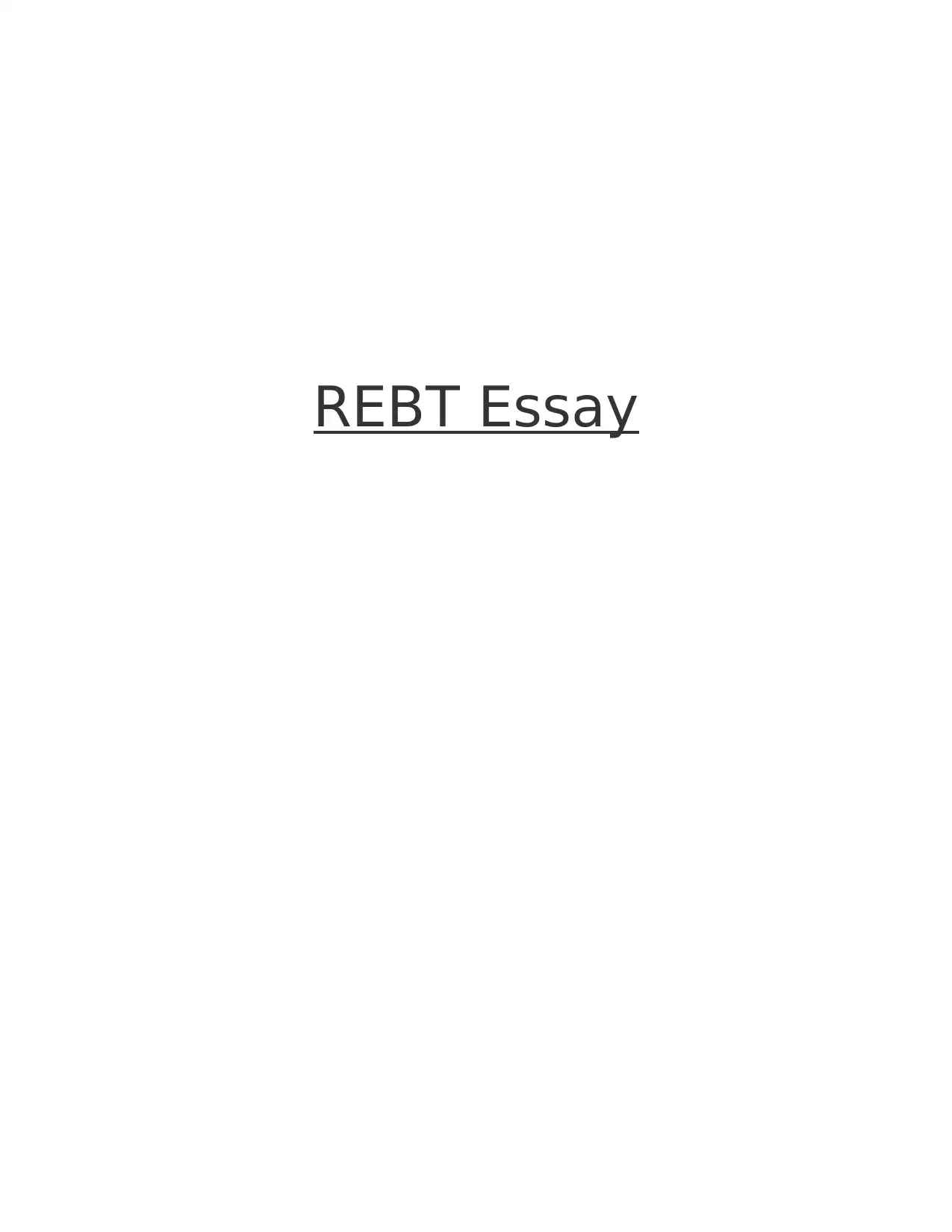
REBT Essay
Paraphrase This Document
Need a fresh take? Get an instant paraphrase of this document with our AI Paraphraser
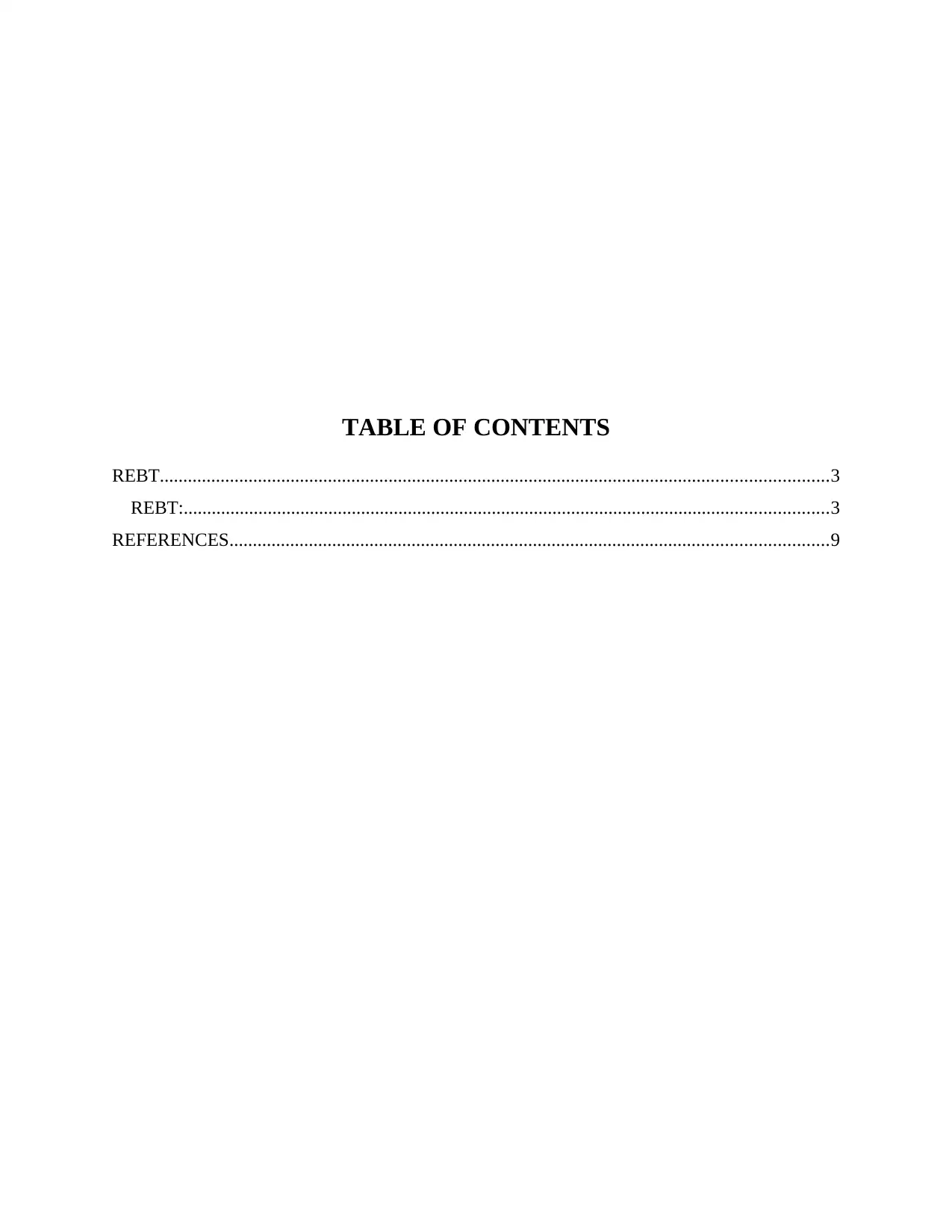
TABLE OF CONTENTS
REBT...............................................................................................................................................3
REBT:..........................................................................................................................................3
REFERENCES................................................................................................................................9
REBT...............................................................................................................................................3
REBT:..........................................................................................................................................3
REFERENCES................................................................................................................................9
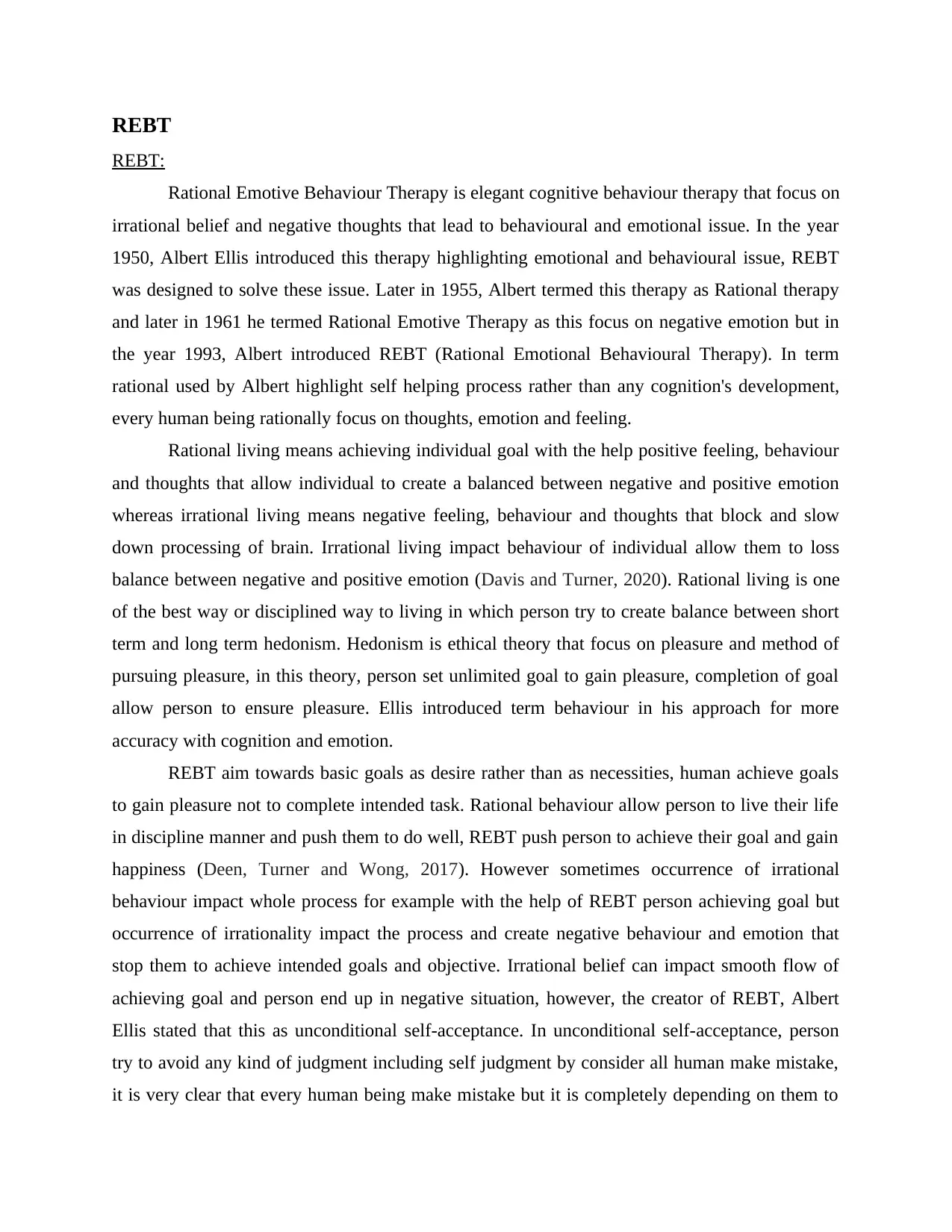
REBT
REBT:
Rational Emotive Behaviour Therapy is elegant cognitive behaviour therapy that focus on
irrational belief and negative thoughts that lead to behavioural and emotional issue. In the year
1950, Albert Ellis introduced this therapy highlighting emotional and behavioural issue, REBT
was designed to solve these issue. Later in 1955, Albert termed this therapy as Rational therapy
and later in 1961 he termed Rational Emotive Therapy as this focus on negative emotion but in
the year 1993, Albert introduced REBT (Rational Emotional Behavioural Therapy). In term
rational used by Albert highlight self helping process rather than any cognition's development,
every human being rationally focus on thoughts, emotion and feeling.
Rational living means achieving individual goal with the help positive feeling, behaviour
and thoughts that allow individual to create a balanced between negative and positive emotion
whereas irrational living means negative feeling, behaviour and thoughts that block and slow
down processing of brain. Irrational living impact behaviour of individual allow them to loss
balance between negative and positive emotion (Davis and Turner, 2020). Rational living is one
of the best way or disciplined way to living in which person try to create balance between short
term and long term hedonism. Hedonism is ethical theory that focus on pleasure and method of
pursuing pleasure, in this theory, person set unlimited goal to gain pleasure, completion of goal
allow person to ensure pleasure. Ellis introduced term behaviour in his approach for more
accuracy with cognition and emotion.
REBT aim towards basic goals as desire rather than as necessities, human achieve goals
to gain pleasure not to complete intended task. Rational behaviour allow person to live their life
in discipline manner and push them to do well, REBT push person to achieve their goal and gain
happiness (Deen, Turner and Wong, 2017). However sometimes occurrence of irrational
behaviour impact whole process for example with the help of REBT person achieving goal but
occurrence of irrationality impact the process and create negative behaviour and emotion that
stop them to achieve intended goals and objective. Irrational belief can impact smooth flow of
achieving goal and person end up in negative situation, however, the creator of REBT, Albert
Ellis stated that this as unconditional self-acceptance. In unconditional self-acceptance, person
try to avoid any kind of judgment including self judgment by consider all human make mistake,
it is very clear that every human being make mistake but it is completely depending on them to
REBT:
Rational Emotive Behaviour Therapy is elegant cognitive behaviour therapy that focus on
irrational belief and negative thoughts that lead to behavioural and emotional issue. In the year
1950, Albert Ellis introduced this therapy highlighting emotional and behavioural issue, REBT
was designed to solve these issue. Later in 1955, Albert termed this therapy as Rational therapy
and later in 1961 he termed Rational Emotive Therapy as this focus on negative emotion but in
the year 1993, Albert introduced REBT (Rational Emotional Behavioural Therapy). In term
rational used by Albert highlight self helping process rather than any cognition's development,
every human being rationally focus on thoughts, emotion and feeling.
Rational living means achieving individual goal with the help positive feeling, behaviour
and thoughts that allow individual to create a balanced between negative and positive emotion
whereas irrational living means negative feeling, behaviour and thoughts that block and slow
down processing of brain. Irrational living impact behaviour of individual allow them to loss
balance between negative and positive emotion (Davis and Turner, 2020). Rational living is one
of the best way or disciplined way to living in which person try to create balance between short
term and long term hedonism. Hedonism is ethical theory that focus on pleasure and method of
pursuing pleasure, in this theory, person set unlimited goal to gain pleasure, completion of goal
allow person to ensure pleasure. Ellis introduced term behaviour in his approach for more
accuracy with cognition and emotion.
REBT aim towards basic goals as desire rather than as necessities, human achieve goals
to gain pleasure not to complete intended task. Rational behaviour allow person to live their life
in discipline manner and push them to do well, REBT push person to achieve their goal and gain
happiness (Deen, Turner and Wong, 2017). However sometimes occurrence of irrational
behaviour impact whole process for example with the help of REBT person achieving goal but
occurrence of irrationality impact the process and create negative behaviour and emotion that
stop them to achieve intended goals and objective. Irrational belief can impact smooth flow of
achieving goal and person end up in negative situation, however, the creator of REBT, Albert
Ellis stated that this as unconditional self-acceptance. In unconditional self-acceptance, person
try to avoid any kind of judgment including self judgment by consider all human make mistake,
it is very clear that every human being make mistake but it is completely depending on them to
⊘ This is a preview!⊘
Do you want full access?
Subscribe today to unlock all pages.

Trusted by 1+ million students worldwide
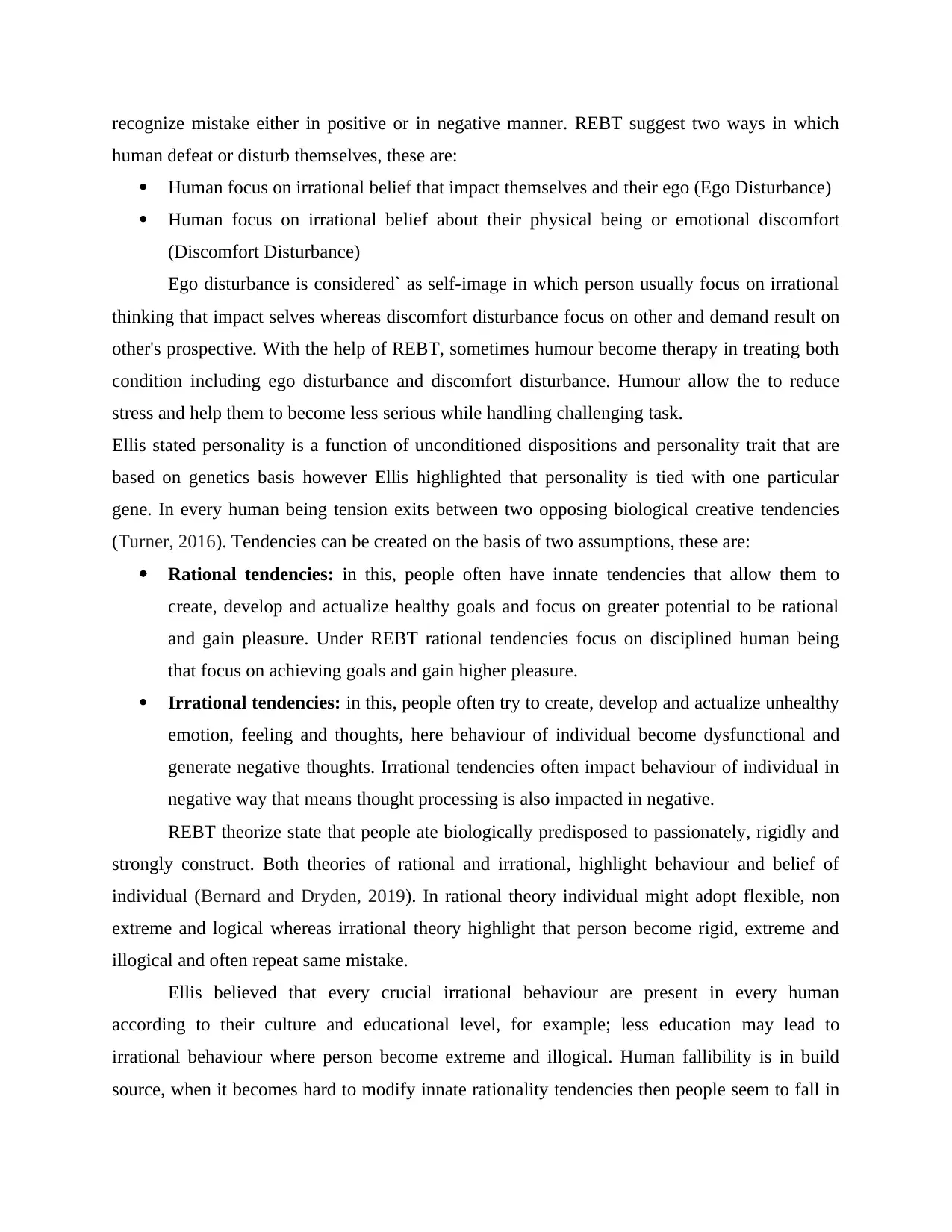
recognize mistake either in positive or in negative manner. REBT suggest two ways in which
human defeat or disturb themselves, these are:
Human focus on irrational belief that impact themselves and their ego (Ego Disturbance)
Human focus on irrational belief about their physical being or emotional discomfort
(Discomfort Disturbance)
Ego disturbance is considered` as self-image in which person usually focus on irrational
thinking that impact selves whereas discomfort disturbance focus on other and demand result on
other's prospective. With the help of REBT, sometimes humour become therapy in treating both
condition including ego disturbance and discomfort disturbance. Humour allow the to reduce
stress and help them to become less serious while handling challenging task.
Ellis stated personality is a function of unconditioned dispositions and personality trait that are
based on genetics basis however Ellis highlighted that personality is tied with one particular
gene. In every human being tension exits between two opposing biological creative tendencies
(Turner, 2016). Tendencies can be created on the basis of two assumptions, these are:
Rational tendencies: in this, people often have innate tendencies that allow them to
create, develop and actualize healthy goals and focus on greater potential to be rational
and gain pleasure. Under REBT rational tendencies focus on disciplined human being
that focus on achieving goals and gain higher pleasure.
Irrational tendencies: in this, people often try to create, develop and actualize unhealthy
emotion, feeling and thoughts, here behaviour of individual become dysfunctional and
generate negative thoughts. Irrational tendencies often impact behaviour of individual in
negative way that means thought processing is also impacted in negative.
REBT theorize state that people ate biologically predisposed to passionately, rigidly and
strongly construct. Both theories of rational and irrational, highlight behaviour and belief of
individual (Bernard and Dryden, 2019). In rational theory individual might adopt flexible, non
extreme and logical whereas irrational theory highlight that person become rigid, extreme and
illogical and often repeat same mistake.
Ellis believed that every crucial irrational behaviour are present in every human
according to their culture and educational level, for example; less education may lead to
irrational behaviour where person become extreme and illogical. Human fallibility is in build
source, when it becomes hard to modify innate rationality tendencies then people seem to fall in
human defeat or disturb themselves, these are:
Human focus on irrational belief that impact themselves and their ego (Ego Disturbance)
Human focus on irrational belief about their physical being or emotional discomfort
(Discomfort Disturbance)
Ego disturbance is considered` as self-image in which person usually focus on irrational
thinking that impact selves whereas discomfort disturbance focus on other and demand result on
other's prospective. With the help of REBT, sometimes humour become therapy in treating both
condition including ego disturbance and discomfort disturbance. Humour allow the to reduce
stress and help them to become less serious while handling challenging task.
Ellis stated personality is a function of unconditioned dispositions and personality trait that are
based on genetics basis however Ellis highlighted that personality is tied with one particular
gene. In every human being tension exits between two opposing biological creative tendencies
(Turner, 2016). Tendencies can be created on the basis of two assumptions, these are:
Rational tendencies: in this, people often have innate tendencies that allow them to
create, develop and actualize healthy goals and focus on greater potential to be rational
and gain pleasure. Under REBT rational tendencies focus on disciplined human being
that focus on achieving goals and gain higher pleasure.
Irrational tendencies: in this, people often try to create, develop and actualize unhealthy
emotion, feeling and thoughts, here behaviour of individual become dysfunctional and
generate negative thoughts. Irrational tendencies often impact behaviour of individual in
negative way that means thought processing is also impacted in negative.
REBT theorize state that people ate biologically predisposed to passionately, rigidly and
strongly construct. Both theories of rational and irrational, highlight behaviour and belief of
individual (Bernard and Dryden, 2019). In rational theory individual might adopt flexible, non
extreme and logical whereas irrational theory highlight that person become rigid, extreme and
illogical and often repeat same mistake.
Ellis believed that every crucial irrational behaviour are present in every human
according to their culture and educational level, for example; less education may lead to
irrational behaviour where person become extreme and illogical. Human fallibility is in build
source, when it becomes hard to modify innate rationality tendencies then people seem to fall in
Paraphrase This Document
Need a fresh take? Get an instant paraphrase of this document with our AI Paraphraser
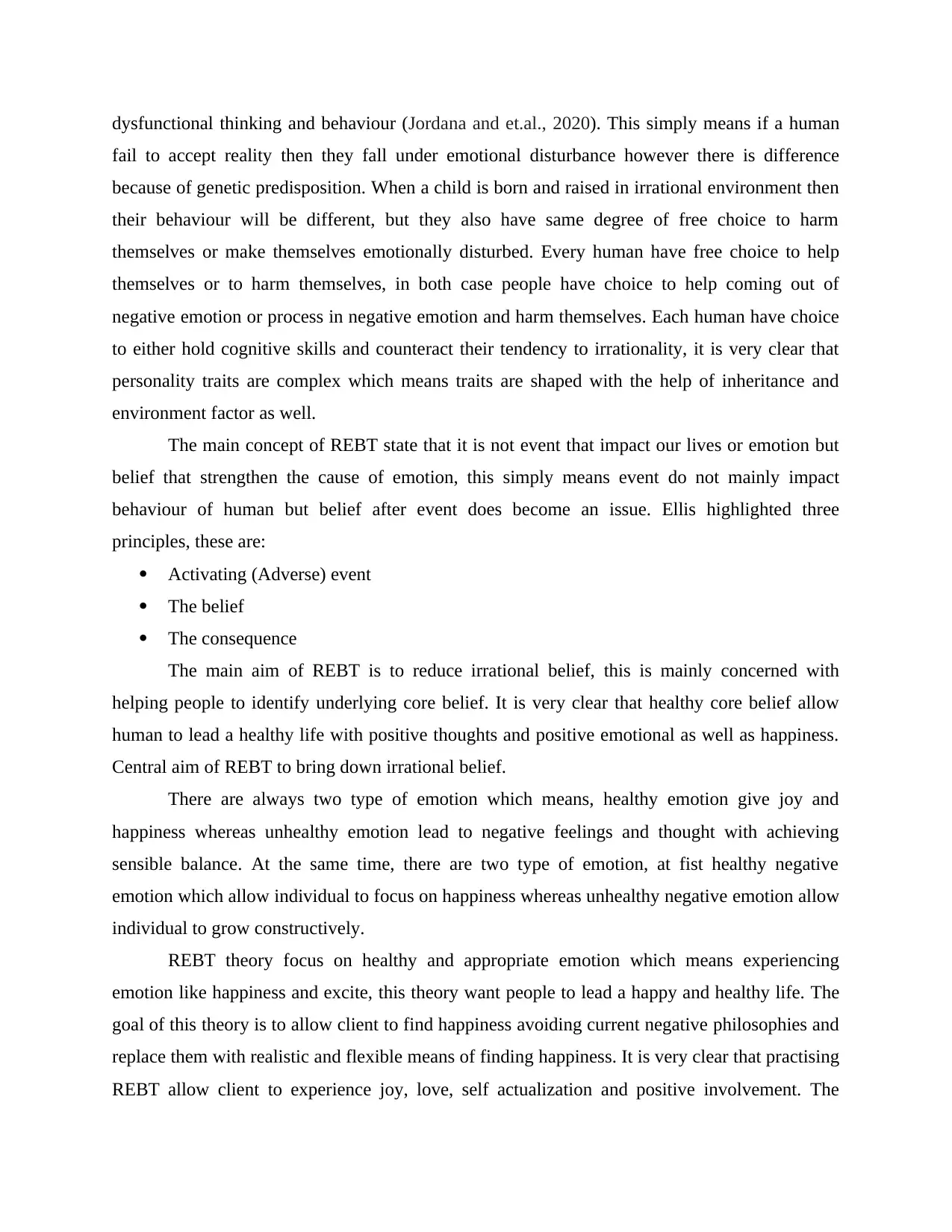
dysfunctional thinking and behaviour (Jordana and et.al., 2020). This simply means if a human
fail to accept reality then they fall under emotional disturbance however there is difference
because of genetic predisposition. When a child is born and raised in irrational environment then
their behaviour will be different, but they also have same degree of free choice to harm
themselves or make themselves emotionally disturbed. Every human have free choice to help
themselves or to harm themselves, in both case people have choice to help coming out of
negative emotion or process in negative emotion and harm themselves. Each human have choice
to either hold cognitive skills and counteract their tendency to irrationality, it is very clear that
personality traits are complex which means traits are shaped with the help of inheritance and
environment factor as well.
The main concept of REBT state that it is not event that impact our lives or emotion but
belief that strengthen the cause of emotion, this simply means event do not mainly impact
behaviour of human but belief after event does become an issue. Ellis highlighted three
principles, these are:
Activating (Adverse) event
The belief
The consequence
The main aim of REBT is to reduce irrational belief, this is mainly concerned with
helping people to identify underlying core belief. It is very clear that healthy core belief allow
human to lead a healthy life with positive thoughts and positive emotional as well as happiness.
Central aim of REBT to bring down irrational belief.
There are always two type of emotion which means, healthy emotion give joy and
happiness whereas unhealthy emotion lead to negative feelings and thought with achieving
sensible balance. At the same time, there are two type of emotion, at fist healthy negative
emotion which allow individual to focus on happiness whereas unhealthy negative emotion allow
individual to grow constructively.
REBT theory focus on healthy and appropriate emotion which means experiencing
emotion like happiness and excite, this theory want people to lead a happy and healthy life. The
goal of this theory is to allow client to find happiness avoiding current negative philosophies and
replace them with realistic and flexible means of finding happiness. It is very clear that practising
REBT allow client to experience joy, love, self actualization and positive involvement. The
fail to accept reality then they fall under emotional disturbance however there is difference
because of genetic predisposition. When a child is born and raised in irrational environment then
their behaviour will be different, but they also have same degree of free choice to harm
themselves or make themselves emotionally disturbed. Every human have free choice to help
themselves or to harm themselves, in both case people have choice to help coming out of
negative emotion or process in negative emotion and harm themselves. Each human have choice
to either hold cognitive skills and counteract their tendency to irrationality, it is very clear that
personality traits are complex which means traits are shaped with the help of inheritance and
environment factor as well.
The main concept of REBT state that it is not event that impact our lives or emotion but
belief that strengthen the cause of emotion, this simply means event do not mainly impact
behaviour of human but belief after event does become an issue. Ellis highlighted three
principles, these are:
Activating (Adverse) event
The belief
The consequence
The main aim of REBT is to reduce irrational belief, this is mainly concerned with
helping people to identify underlying core belief. It is very clear that healthy core belief allow
human to lead a healthy life with positive thoughts and positive emotional as well as happiness.
Central aim of REBT to bring down irrational belief.
There are always two type of emotion which means, healthy emotion give joy and
happiness whereas unhealthy emotion lead to negative feelings and thought with achieving
sensible balance. At the same time, there are two type of emotion, at fist healthy negative
emotion which allow individual to focus on happiness whereas unhealthy negative emotion allow
individual to grow constructively.
REBT theory focus on healthy and appropriate emotion which means experiencing
emotion like happiness and excite, this theory want people to lead a happy and healthy life. The
goal of this theory is to allow client to find happiness avoiding current negative philosophies and
replace them with realistic and flexible means of finding happiness. It is very clear that practising
REBT allow client to experience joy, love, self actualization and positive involvement. The
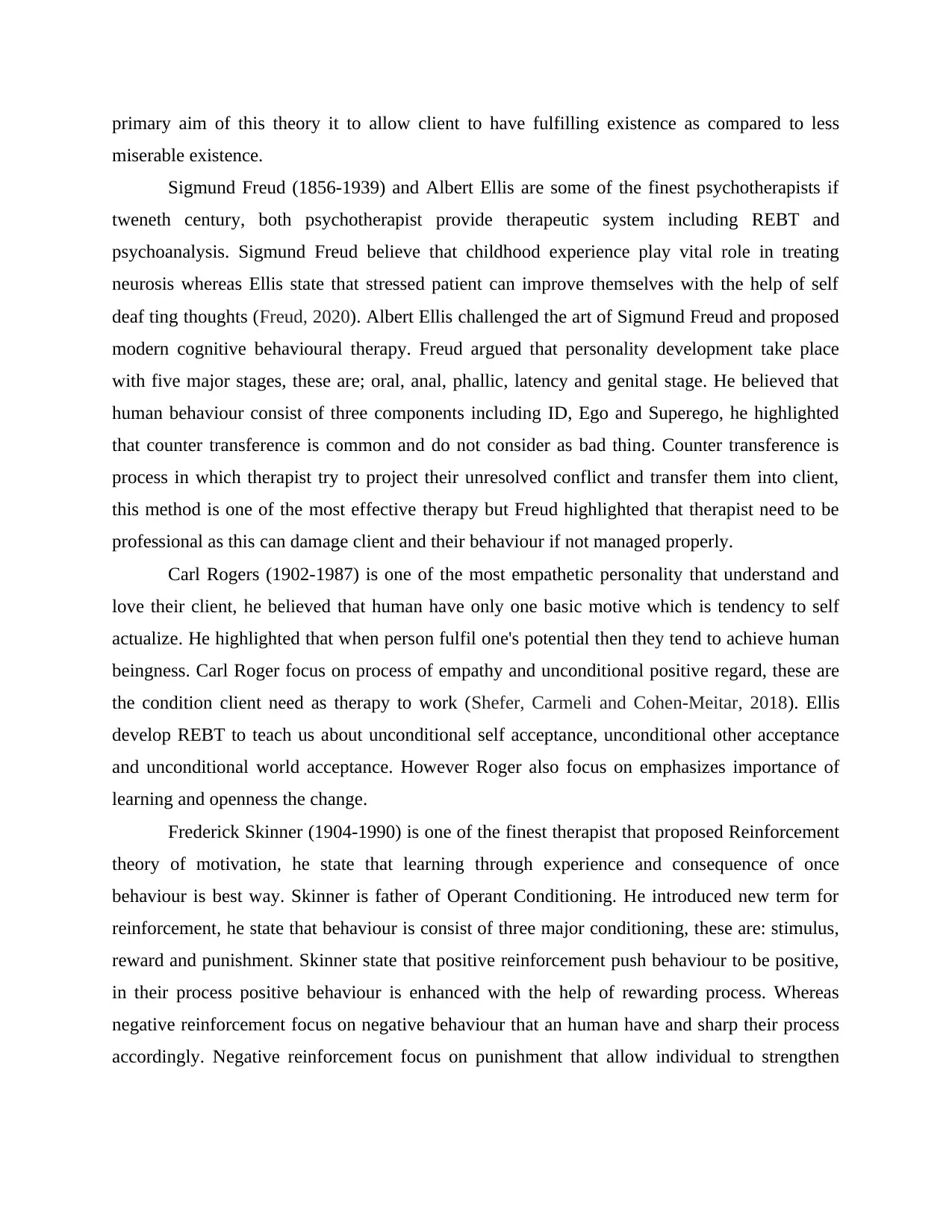
primary aim of this theory it to allow client to have fulfilling existence as compared to less
miserable existence.
Sigmund Freud (1856-1939) and Albert Ellis are some of the finest psychotherapists if
tweneth century, both psychotherapist provide therapeutic system including REBT and
psychoanalysis. Sigmund Freud believe that childhood experience play vital role in treating
neurosis whereas Ellis state that stressed patient can improve themselves with the help of self
deaf ting thoughts (Freud, 2020). Albert Ellis challenged the art of Sigmund Freud and proposed
modern cognitive behavioural therapy. Freud argued that personality development take place
with five major stages, these are; oral, anal, phallic, latency and genital stage. He believed that
human behaviour consist of three components including ID, Ego and Superego, he highlighted
that counter transference is common and do not consider as bad thing. Counter transference is
process in which therapist try to project their unresolved conflict and transfer them into client,
this method is one of the most effective therapy but Freud highlighted that therapist need to be
professional as this can damage client and their behaviour if not managed properly.
Carl Rogers (1902-1987) is one of the most empathetic personality that understand and
love their client, he believed that human have only one basic motive which is tendency to self
actualize. He highlighted that when person fulfil one's potential then they tend to achieve human
beingness. Carl Roger focus on process of empathy and unconditional positive regard, these are
the condition client need as therapy to work (Shefer, Carmeli and Cohen‐Meitar, 2018). Ellis
develop REBT to teach us about unconditional self acceptance, unconditional other acceptance
and unconditional world acceptance. However Roger also focus on emphasizes importance of
learning and openness the change.
Frederick Skinner (1904-1990) is one of the finest therapist that proposed Reinforcement
theory of motivation, he state that learning through experience and consequence of once
behaviour is best way. Skinner is father of Operant Conditioning. He introduced new term for
reinforcement, he state that behaviour is consist of three major conditioning, these are: stimulus,
reward and punishment. Skinner state that positive reinforcement push behaviour to be positive,
in their process positive behaviour is enhanced with the help of rewarding process. Whereas
negative reinforcement focus on negative behaviour that an human have and sharp their process
accordingly. Negative reinforcement focus on punishment that allow individual to strengthen
miserable existence.
Sigmund Freud (1856-1939) and Albert Ellis are some of the finest psychotherapists if
tweneth century, both psychotherapist provide therapeutic system including REBT and
psychoanalysis. Sigmund Freud believe that childhood experience play vital role in treating
neurosis whereas Ellis state that stressed patient can improve themselves with the help of self
deaf ting thoughts (Freud, 2020). Albert Ellis challenged the art of Sigmund Freud and proposed
modern cognitive behavioural therapy. Freud argued that personality development take place
with five major stages, these are; oral, anal, phallic, latency and genital stage. He believed that
human behaviour consist of three components including ID, Ego and Superego, he highlighted
that counter transference is common and do not consider as bad thing. Counter transference is
process in which therapist try to project their unresolved conflict and transfer them into client,
this method is one of the most effective therapy but Freud highlighted that therapist need to be
professional as this can damage client and their behaviour if not managed properly.
Carl Rogers (1902-1987) is one of the most empathetic personality that understand and
love their client, he believed that human have only one basic motive which is tendency to self
actualize. He highlighted that when person fulfil one's potential then they tend to achieve human
beingness. Carl Roger focus on process of empathy and unconditional positive regard, these are
the condition client need as therapy to work (Shefer, Carmeli and Cohen‐Meitar, 2018). Ellis
develop REBT to teach us about unconditional self acceptance, unconditional other acceptance
and unconditional world acceptance. However Roger also focus on emphasizes importance of
learning and openness the change.
Frederick Skinner (1904-1990) is one of the finest therapist that proposed Reinforcement
theory of motivation, he state that learning through experience and consequence of once
behaviour is best way. Skinner is father of Operant Conditioning. He introduced new term for
reinforcement, he state that behaviour is consist of three major conditioning, these are: stimulus,
reward and punishment. Skinner state that positive reinforcement push behaviour to be positive,
in their process positive behaviour is enhanced with the help of rewarding process. Whereas
negative reinforcement focus on negative behaviour that an human have and sharp their process
accordingly. Negative reinforcement focus on punishment that allow individual to strengthen
⊘ This is a preview!⊘
Do you want full access?
Subscribe today to unlock all pages.

Trusted by 1+ million students worldwide
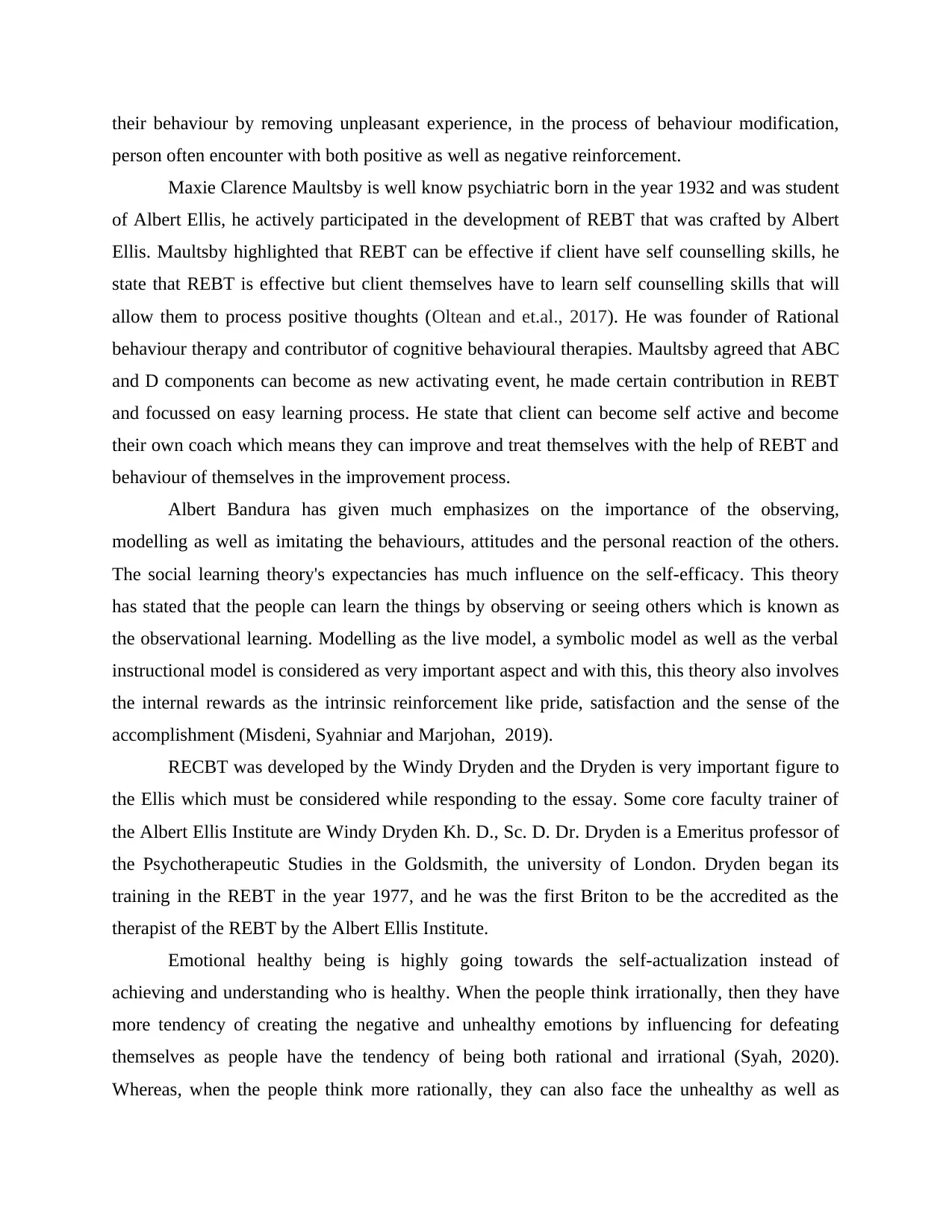
their behaviour by removing unpleasant experience, in the process of behaviour modification,
person often encounter with both positive as well as negative reinforcement.
Maxie Clarence Maultsby is well know psychiatric born in the year 1932 and was student
of Albert Ellis, he actively participated in the development of REBT that was crafted by Albert
Ellis. Maultsby highlighted that REBT can be effective if client have self counselling skills, he
state that REBT is effective but client themselves have to learn self counselling skills that will
allow them to process positive thoughts (Oltean and et.al., 2017). He was founder of Rational
behaviour therapy and contributor of cognitive behavioural therapies. Maultsby agreed that ABC
and D components can become as new activating event, he made certain contribution in REBT
and focussed on easy learning process. He state that client can become self active and become
their own coach which means they can improve and treat themselves with the help of REBT and
behaviour of themselves in the improvement process.
Albert Bandura has given much emphasizes on the importance of the observing,
modelling as well as imitating the behaviours, attitudes and the personal reaction of the others.
The social learning theory's expectancies has much influence on the self-efficacy. This theory
has stated that the people can learn the things by observing or seeing others which is known as
the observational learning. Modelling as the live model, a symbolic model as well as the verbal
instructional model is considered as very important aspect and with this, this theory also involves
the internal rewards as the intrinsic reinforcement like pride, satisfaction and the sense of the
accomplishment (Misdeni, Syahniar and Marjohan, 2019).
RECBT was developed by the Windy Dryden and the Dryden is very important figure to
the Ellis which must be considered while responding to the essay. Some core faculty trainer of
the Albert Ellis Institute are Windy Dryden Kh. D., Sc. D. Dr. Dryden is a Emeritus professor of
the Psychotherapeutic Studies in the Goldsmith, the university of London. Dryden began its
training in the REBT in the year 1977, and he was the first Briton to be the accredited as the
therapist of the REBT by the Albert Ellis Institute.
Emotional healthy being is highly going towards the self-actualization instead of
achieving and understanding who is healthy. When the people think irrationally, then they have
more tendency of creating the negative and unhealthy emotions by influencing for defeating
themselves as people have the tendency of being both rational and irrational (Syah, 2020).
Whereas, when the people think more rationally, they can also face the unhealthy as well as
person often encounter with both positive as well as negative reinforcement.
Maxie Clarence Maultsby is well know psychiatric born in the year 1932 and was student
of Albert Ellis, he actively participated in the development of REBT that was crafted by Albert
Ellis. Maultsby highlighted that REBT can be effective if client have self counselling skills, he
state that REBT is effective but client themselves have to learn self counselling skills that will
allow them to process positive thoughts (Oltean and et.al., 2017). He was founder of Rational
behaviour therapy and contributor of cognitive behavioural therapies. Maultsby agreed that ABC
and D components can become as new activating event, he made certain contribution in REBT
and focussed on easy learning process. He state that client can become self active and become
their own coach which means they can improve and treat themselves with the help of REBT and
behaviour of themselves in the improvement process.
Albert Bandura has given much emphasizes on the importance of the observing,
modelling as well as imitating the behaviours, attitudes and the personal reaction of the others.
The social learning theory's expectancies has much influence on the self-efficacy. This theory
has stated that the people can learn the things by observing or seeing others which is known as
the observational learning. Modelling as the live model, a symbolic model as well as the verbal
instructional model is considered as very important aspect and with this, this theory also involves
the internal rewards as the intrinsic reinforcement like pride, satisfaction and the sense of the
accomplishment (Misdeni, Syahniar and Marjohan, 2019).
RECBT was developed by the Windy Dryden and the Dryden is very important figure to
the Ellis which must be considered while responding to the essay. Some core faculty trainer of
the Albert Ellis Institute are Windy Dryden Kh. D., Sc. D. Dr. Dryden is a Emeritus professor of
the Psychotherapeutic Studies in the Goldsmith, the university of London. Dryden began its
training in the REBT in the year 1977, and he was the first Briton to be the accredited as the
therapist of the REBT by the Albert Ellis Institute.
Emotional healthy being is highly going towards the self-actualization instead of
achieving and understanding who is healthy. When the people think irrationally, then they have
more tendency of creating the negative and unhealthy emotions by influencing for defeating
themselves as people have the tendency of being both rational and irrational (Syah, 2020).
Whereas, when the people think more rationally, they can also face the unhealthy as well as
Paraphrase This Document
Need a fresh take? Get an instant paraphrase of this document with our AI Paraphraser
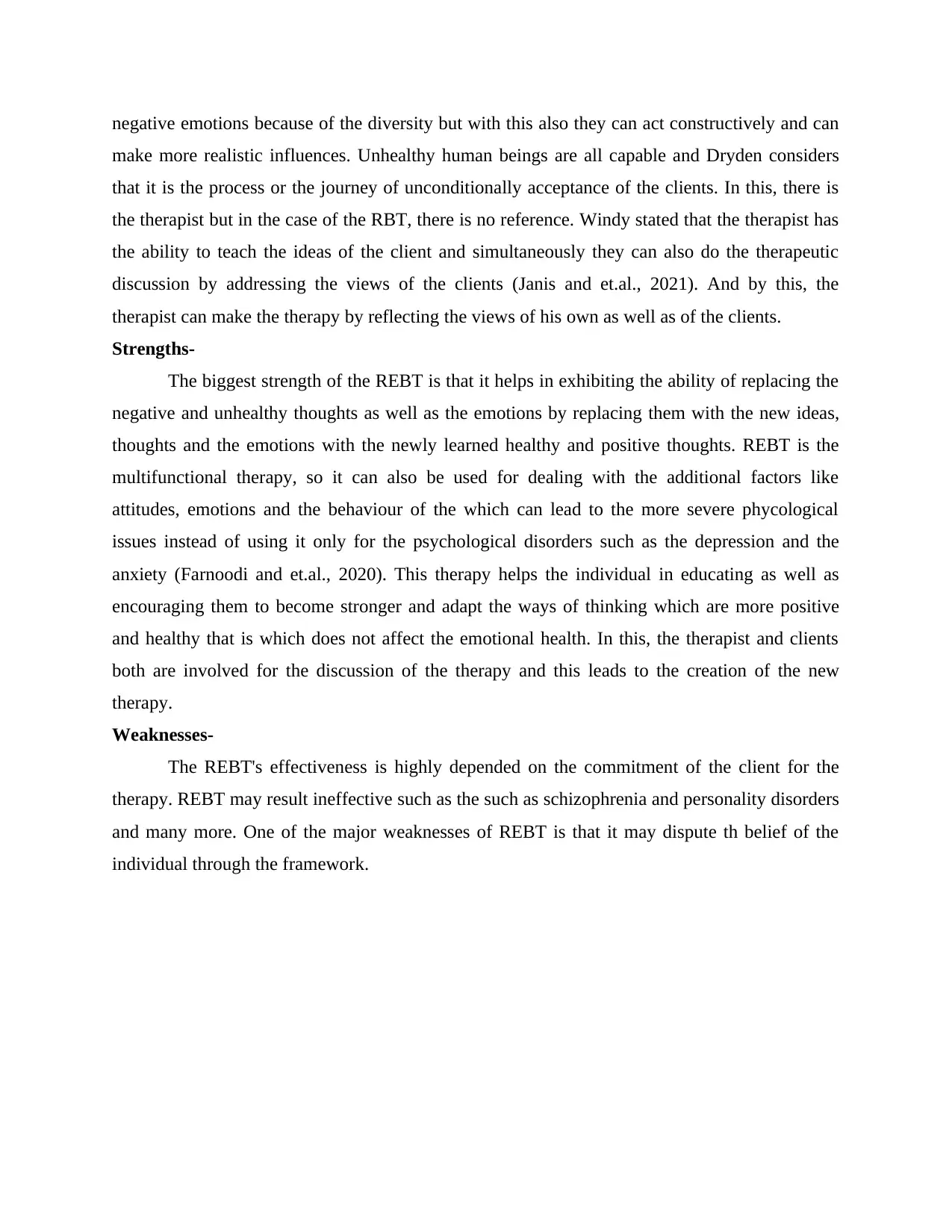
negative emotions because of the diversity but with this also they can act constructively and can
make more realistic influences. Unhealthy human beings are all capable and Dryden considers
that it is the process or the journey of unconditionally acceptance of the clients. In this, there is
the therapist but in the case of the RBT, there is no reference. Windy stated that the therapist has
the ability to teach the ideas of the client and simultaneously they can also do the therapeutic
discussion by addressing the views of the clients (Janis and et.al., 2021). And by this, the
therapist can make the therapy by reflecting the views of his own as well as of the clients.
Strengths-
The biggest strength of the REBT is that it helps in exhibiting the ability of replacing the
negative and unhealthy thoughts as well as the emotions by replacing them with the new ideas,
thoughts and the emotions with the newly learned healthy and positive thoughts. REBT is the
multifunctional therapy, so it can also be used for dealing with the additional factors like
attitudes, emotions and the behaviour of the which can lead to the more severe phycological
issues instead of using it only for the psychological disorders such as the depression and the
anxiety (Farnoodi and et.al., 2020). This therapy helps the individual in educating as well as
encouraging them to become stronger and adapt the ways of thinking which are more positive
and healthy that is which does not affect the emotional health. In this, the therapist and clients
both are involved for the discussion of the therapy and this leads to the creation of the new
therapy.
Weaknesses-
The REBT's effectiveness is highly depended on the commitment of the client for the
therapy. REBT may result ineffective such as the such as schizophrenia and personality disorders
and many more. One of the major weaknesses of REBT is that it may dispute th belief of the
individual through the framework.
make more realistic influences. Unhealthy human beings are all capable and Dryden considers
that it is the process or the journey of unconditionally acceptance of the clients. In this, there is
the therapist but in the case of the RBT, there is no reference. Windy stated that the therapist has
the ability to teach the ideas of the client and simultaneously they can also do the therapeutic
discussion by addressing the views of the clients (Janis and et.al., 2021). And by this, the
therapist can make the therapy by reflecting the views of his own as well as of the clients.
Strengths-
The biggest strength of the REBT is that it helps in exhibiting the ability of replacing the
negative and unhealthy thoughts as well as the emotions by replacing them with the new ideas,
thoughts and the emotions with the newly learned healthy and positive thoughts. REBT is the
multifunctional therapy, so it can also be used for dealing with the additional factors like
attitudes, emotions and the behaviour of the which can lead to the more severe phycological
issues instead of using it only for the psychological disorders such as the depression and the
anxiety (Farnoodi and et.al., 2020). This therapy helps the individual in educating as well as
encouraging them to become stronger and adapt the ways of thinking which are more positive
and healthy that is which does not affect the emotional health. In this, the therapist and clients
both are involved for the discussion of the therapy and this leads to the creation of the new
therapy.
Weaknesses-
The REBT's effectiveness is highly depended on the commitment of the client for the
therapy. REBT may result ineffective such as the such as schizophrenia and personality disorders
and many more. One of the major weaknesses of REBT is that it may dispute th belief of the
individual through the framework.

REFERENCES
Books and journals
Bernard, M.E. and Dryden, W., 2019. Advances in REBT. Springer Nature Switzerland.
Davis, H. and Turner, M.J., 2020. The use of rational emotive behavior therapy (REBT) to
increase the self-determined motivation and psychological well-being of
triathletes. Sport, Exercise, and Performance Psychology, 9(4), p.489.
Deen, S., Turner, M.J. and Wong, R.S., 2017. The effects of REBT, and the use of credos, on
irrational beliefs and resilience qualities in athletes. The Sport Psychologist, 31(3),
pp.249-263.
Farnoodi, F., and et.al., 2020. Comparing the Effectiveness of Ellis' Rational-Emotive-Behavior
Therapy (REBT) and Glasser's Reality Therapy (RT) on Reducing Depression
Symptoms in Hemodialysis Patients and Control Group. Archives of Pharmacy
Practice, 1, p.161.
Freud, S., 2020. Sigmund Freud (pp. 1-37). Routledge.
Janis, R.A.,and et.al., 2021. Group therapy for mood disorders: A meta-analysis. Psychotherapy
research, 31(3), pp.342-358.
Jordana and et.al., 2020. A systematic mapping review on the use of Rational Emotive Behavior
Therapy (REBT) with athletes. International Review of Sport and Exercise Psychology,
pp.1-26.
Misdeni, M., Syahniar, S. and Marjohan, M., 2019. The effectiveness of rational emotive
behavior therapy approach using a group setting to overcome anxiety of students facing
examinations. International Journal of Research in Counseling and Education, 3(2),
pp.82-88.
Oltean and et.al., 2017. An empirical assessment of REBT models of psychopathology and
psychological health in the prediction of anxiety and depression symptoms. Behavioural
and cognitive psychotherapy, 45(6), pp.600-615.
Shefer, N., Carmeli, A. and Cohen‐Meitar, R., 2018. Bringing Carl Rogers back in: Exploring the
power of positive regard at work. British Journal of Management, 29(1), pp.63-81.
Syah, M.E., 2020. Rational Emotional Behavior Therapy (REBT) to Reduce Anxiety Bullying
Victims in Adolescents. Journal of Family Sciences, 5(1), pp.36-46.
Turner, M.J., 2016. Rational emotive behavior therapy (REBT), irrational and rational beliefs,
and the mental health of athletes. Frontiers in psychology, 7, p.1423.
Books and journals
Bernard, M.E. and Dryden, W., 2019. Advances in REBT. Springer Nature Switzerland.
Davis, H. and Turner, M.J., 2020. The use of rational emotive behavior therapy (REBT) to
increase the self-determined motivation and psychological well-being of
triathletes. Sport, Exercise, and Performance Psychology, 9(4), p.489.
Deen, S., Turner, M.J. and Wong, R.S., 2017. The effects of REBT, and the use of credos, on
irrational beliefs and resilience qualities in athletes. The Sport Psychologist, 31(3),
pp.249-263.
Farnoodi, F., and et.al., 2020. Comparing the Effectiveness of Ellis' Rational-Emotive-Behavior
Therapy (REBT) and Glasser's Reality Therapy (RT) on Reducing Depression
Symptoms in Hemodialysis Patients and Control Group. Archives of Pharmacy
Practice, 1, p.161.
Freud, S., 2020. Sigmund Freud (pp. 1-37). Routledge.
Janis, R.A.,and et.al., 2021. Group therapy for mood disorders: A meta-analysis. Psychotherapy
research, 31(3), pp.342-358.
Jordana and et.al., 2020. A systematic mapping review on the use of Rational Emotive Behavior
Therapy (REBT) with athletes. International Review of Sport and Exercise Psychology,
pp.1-26.
Misdeni, M., Syahniar, S. and Marjohan, M., 2019. The effectiveness of rational emotive
behavior therapy approach using a group setting to overcome anxiety of students facing
examinations. International Journal of Research in Counseling and Education, 3(2),
pp.82-88.
Oltean and et.al., 2017. An empirical assessment of REBT models of psychopathology and
psychological health in the prediction of anxiety and depression symptoms. Behavioural
and cognitive psychotherapy, 45(6), pp.600-615.
Shefer, N., Carmeli, A. and Cohen‐Meitar, R., 2018. Bringing Carl Rogers back in: Exploring the
power of positive regard at work. British Journal of Management, 29(1), pp.63-81.
Syah, M.E., 2020. Rational Emotional Behavior Therapy (REBT) to Reduce Anxiety Bullying
Victims in Adolescents. Journal of Family Sciences, 5(1), pp.36-46.
Turner, M.J., 2016. Rational emotive behavior therapy (REBT), irrational and rational beliefs,
and the mental health of athletes. Frontiers in psychology, 7, p.1423.
⊘ This is a preview!⊘
Do you want full access?
Subscribe today to unlock all pages.

Trusted by 1+ million students worldwide

1 out of 10
Related Documents
Your All-in-One AI-Powered Toolkit for Academic Success.
+13062052269
info@desklib.com
Available 24*7 on WhatsApp / Email
![[object Object]](/_next/static/media/star-bottom.7253800d.svg)
Unlock your academic potential
Copyright © 2020–2025 A2Z Services. All Rights Reserved. Developed and managed by ZUCOL.





